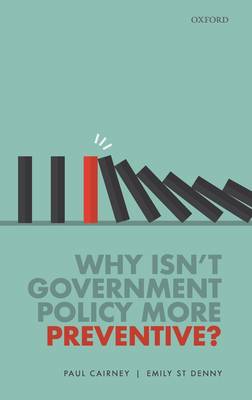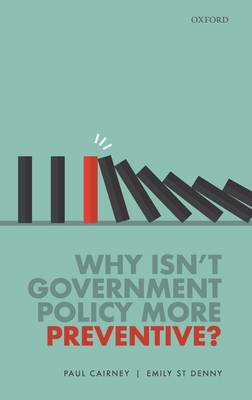
- Retrait gratuit dans votre magasin Club
- 7.000.000 titres dans notre catalogue
- Payer en toute sécurité
- Toujours un magasin près de chez vous
- Retrait gratuit dans votre magasin Club
- 7.000.000 titres dans notre catalogue
- Payer en toute sécurité
- Toujours un magasin près de chez vous
169,45 €
+ 338 points
Description
If 'prevention is better than cure', why isn't policy more preventive? Policymakers only have the ability to pay attention to, and influence, a tiny proportion of their responsibilities, and they engage in a policymaking environment of which they have limited understanding and even less control. This simple insight helps explain the gap between stated policymaker expectations and actual policy outcomes. Why Isn't Government Policy more Preventive? uses these insights to produce new empirical studies of 'wicked' problems with practical lessons. The authors find that the UK and Scottish governments both use a simple idiom - prevention is better than cure - to sell a package of profound changes to policy and policymaking. Taken at face value, this focus on 'prevention' policy seems like an idea 'whose time has come'. Yet, 'prevention' is too ambiguous until governments give it meaning. No government has found a way to turn this vague aim into a set of detailed, consistent, and defendable policies. This book examines what happens when governments make commitments without knowing how to deliver them. It compares their policymaking contexts, roles and responsibilities, policy styles, language, commitments, and outcomes in several cross-cutting policy areas (including health, families, justice, and employability) to make sense of their experiences. The book uses multiple insights from policy theory to help research and analyse the results. The results help policymakers reflect on how to avoid a cycle of optimism and despair when trying to solve problems that their predecessors did not.
Spécifications
Parties prenantes
- Auteur(s) :
- Editeur:
Contenu
- Nombre de pages :
- 304
- Langue:
- Anglais
Caractéristiques
- EAN:
- 9780198793298
- Date de parution :
- 03-03-20
- Format:
- Livre relié
- Format numérique:
- Genaaid
- Dimensions :
- 152 mm x 236 mm
- Poids :
- 566 g







